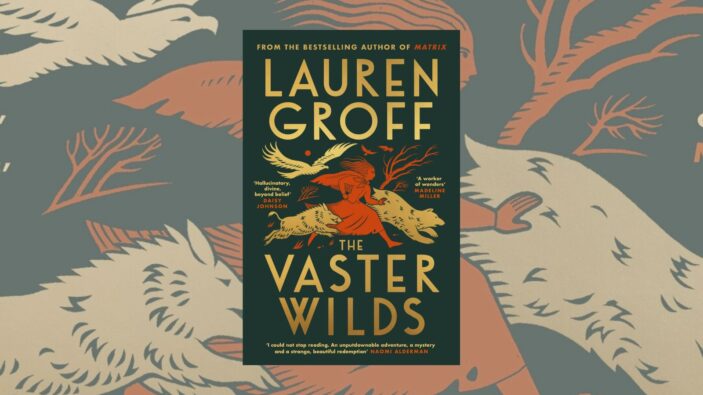
The Vaster Wilds by Lauren Groff is a historical fiction novel set in the early days of North America’s colonisation. This third person narrative explores a servant girl’s escape from a settlement, her battle for survival, the discovery of a new alien environment, and her belief in God.
At the beginning of the book, readers are introduced to a raft of beautiful descriptive scenery in the midst of the servant girl’s escape. The first line: “The moon hides itself behind the clouds. The wind spat an icy snow at angles” perfectly sets up the overall description and a narrative voice that is used consistently throughout. This beautiful use of language transports readers into a mystical and all-encompassing world.
We are immediately thrown into the action of the girl’s intense sprint into the vast wilds, not knowing why she is running. Instead, readers are forced to pick up on the trail of breadcrumbs left hidden amongst the book’s beautiful details. If I haven’t convinced you on how beautiful the descriptive language is, here are some further examples:
“A nothing is a no thing, a nothing is a thing with no past. It was also true that with no past, the girl thought, a nothing could be free.”
“…, But I am not alone for I carry my god in my heart always. / And she did, she felt god, a pinprick of light deep within her.”
“Then the light in the forest went a dark and angry green, and all wind, all sound, died.”
However, such beautiful, transportive, and lyrical verse can come with frustrations – the difficulty of diving in and amongst the pages of such heavy description and being able to remain in such a world without distractions. When I found myself distracted or in an environment that wasn’t quiet, I was often transported out of the book and I had to battle to get back in. So, if you’re a reader that is easily distracted and wish to indulge in such beautiful prose then I recommend sitting in a quiet environment without any distractions. However, if you’re a reader that isn’t as distracted, then I envy your ability and strength.
The choice to use a third person narration is an interesting component of the book. I found that it added additional levels of emotion appropriate to the story. The third person narration made it feel like it was fairy tale-esque, and at times, helped add extra elements of detail to this historical fiction that further immersed me in this beautifully descriptive world. However, as someone who doesn’t often engage with third person narratives, I struggled to get emotionally invested in the story. The novel’s focus, understandably, is primarily on the servant girl, with slight glimpses of other characters offered up now and again. I’d have liked to explore these characters more.
The Vaster Wilds contains immense amounts of philosophy and thought-provoking ideologies, albeit not to the extent where it becomes inaccessible to the everyday reader. The philosophies hidden amongst the pages helped my understanding of the world and to get into the minds and perspectives of the characters. Knowing that this book contained spiritual relationships with God, I initially feared that it would be suffocating, but I was gladly wrong. The girl’s relationship with God doesn’t become a strong plot point until later in the book, and offer up something beautiful even to a non-religious reader.
The book’s ending, was in keeping with the philosophical themes that featured throughout, but not in a way that’s perhaps expected. The book, arguably, doesn’t contain a climax either. Instead, the novel builds up the story of the servant girl on the run, and her survival, which can be quite repetitive, but frustratingly doesn’t deliver at the end.
If you’re a fan of heavy descriptive novels and enjoy books that don’t always have a heavy plot, then I think this book could be for you. For me, however, the heavy description, third person narration, and repetitive story hindered my enjoyment of the novel.
![]()
![]()
![]()
![]()

THREE AND A HALF STARS (OUT OF FIVE)
Lauren Groff’s The Vaster Wilds is out now through Penguin Books. Grab yourself a copy from Booktopia.
